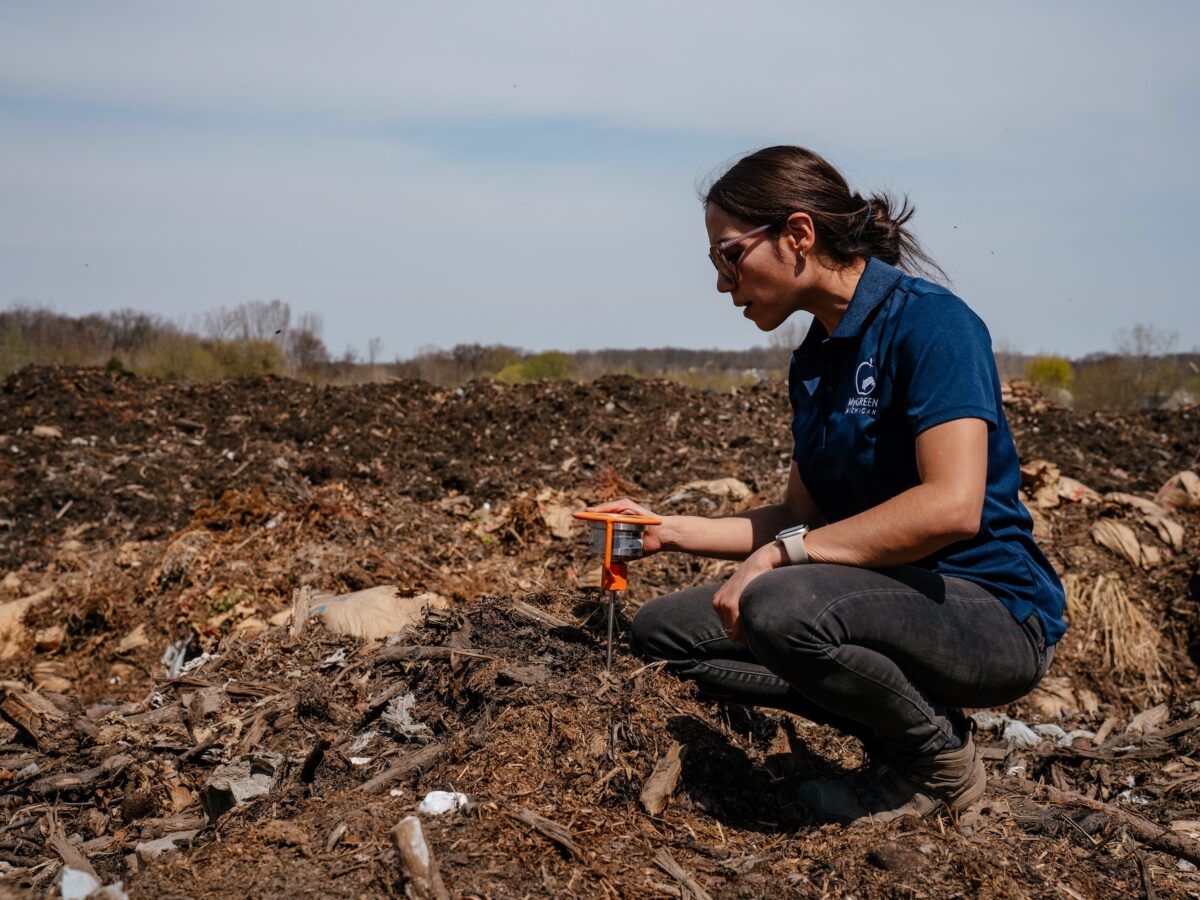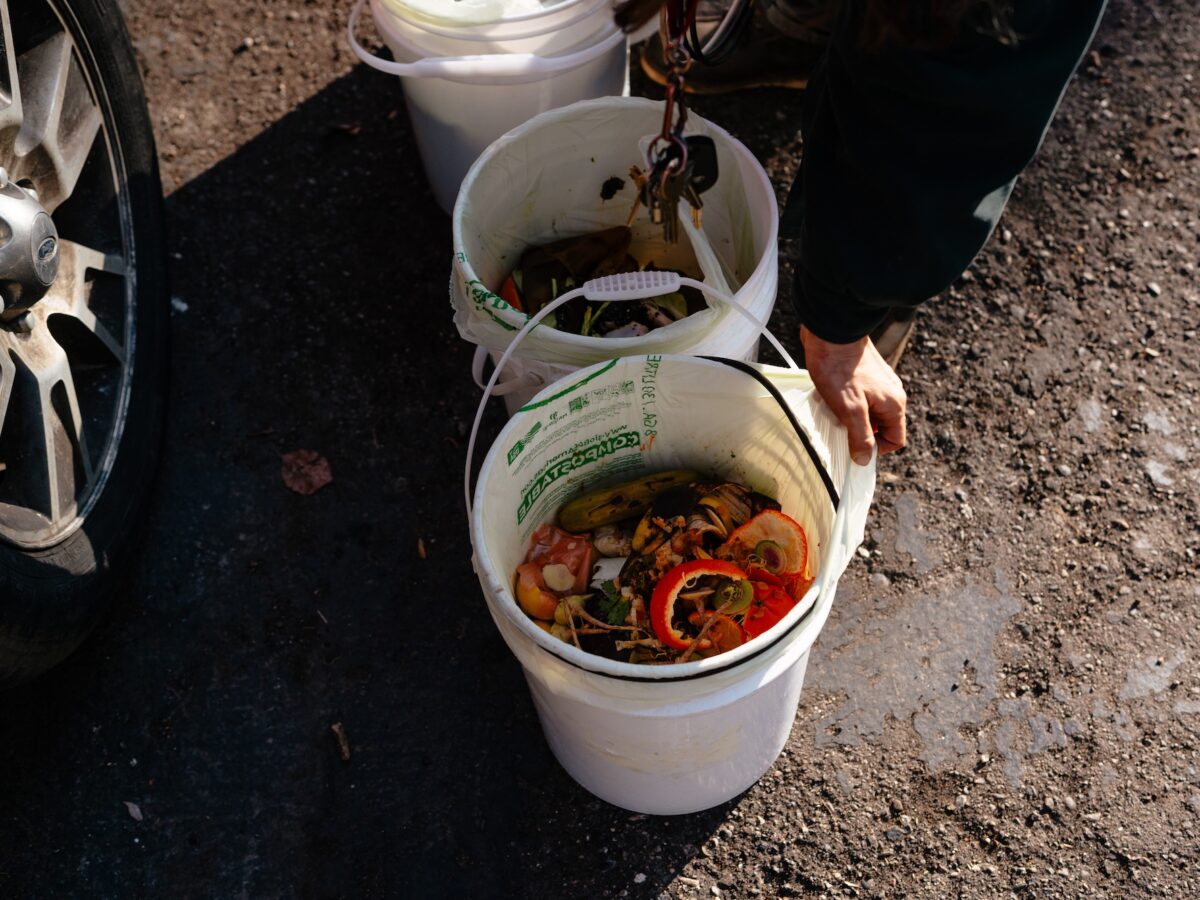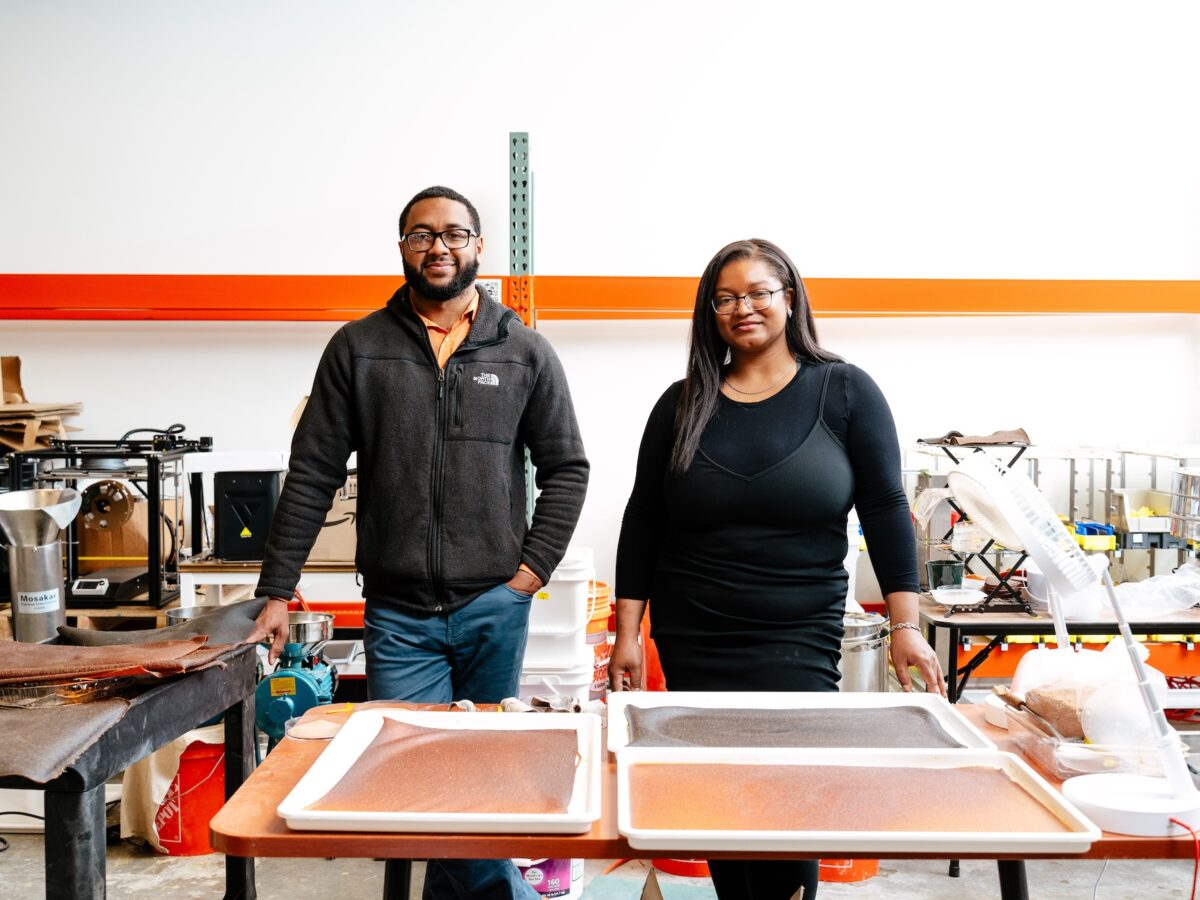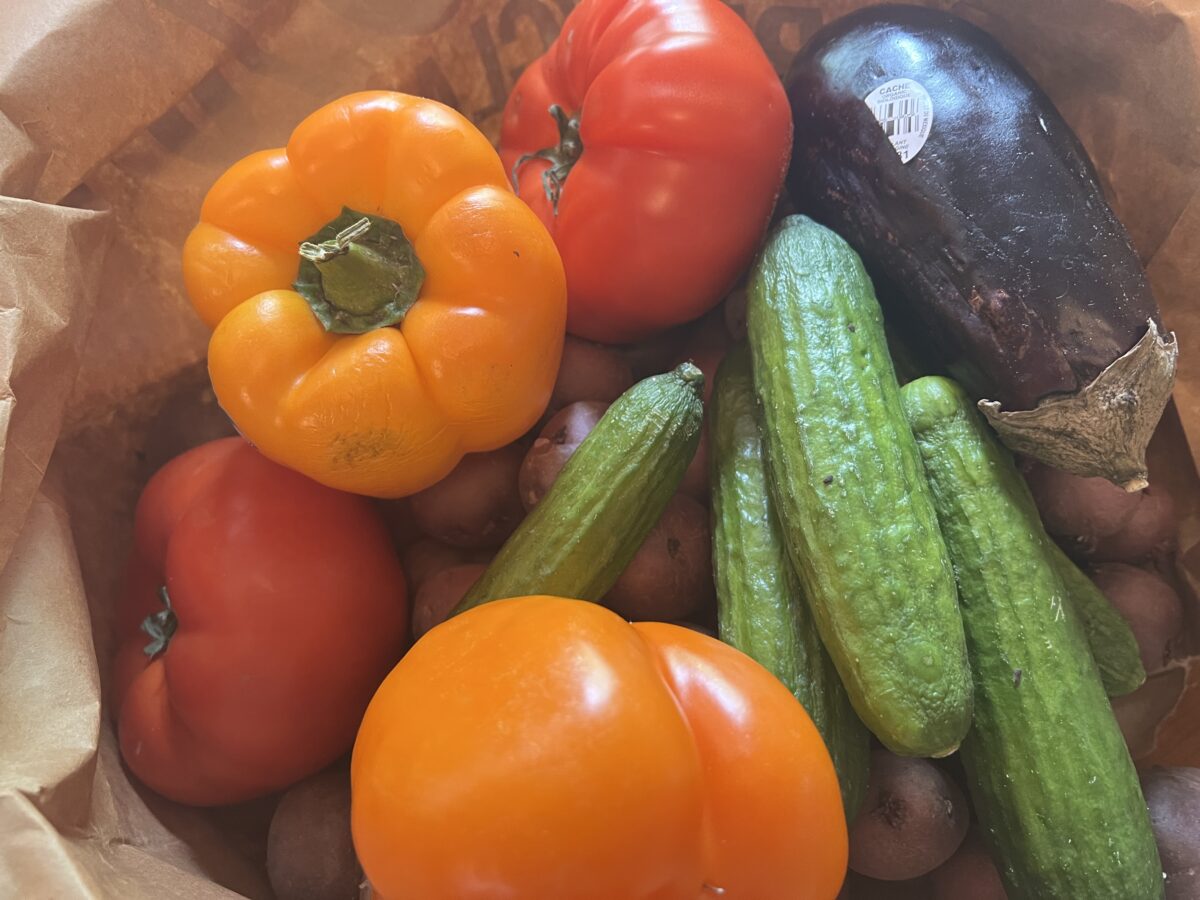Every year, Michigan sends nearly 2 billion pounds (1.67 billion meals’ worth) of food to landfills—much of it still edible or compostable. But it doesn’t have to be this way. From tech tools and compost bins to community fridges and policy change, there are simple, impactful ways to cut food waste and build a more sustainable, equitable food system right here in Metro Detroit. Here’s how to get started.
Table of Contents
- 1. Eat discounted, surplus food through tech tools and subscriptions
- 2. Compost your food scraps—at home, through your city, or with a local service
- 3. Donate usable food—help feed neighbors instead of filling landfills
- 4. Plan meals and shop smart to reduce waste
- 5. Get involved in food waste advocacy and policy change
- 6. Get food help if you’re in need
1. Eat discounted, surplus food through tech tools and subscriptions
Several free apps and platforms make it easier to keep good food out of landfills—while supporting a more sustainable Metro Detroit food system.
📱 Flashfood
🔗 flashfood.com
Buy near-expiration groceries at steep discounts from participating stores like Meijer across Michigan, including many in Metro Detroit. Reserve via the app, then pick up in-store.
📱 Too Good To Go
🔗 toogoodtogo.com
Restaurants, bakeries, and cafes in Detroit, Ferndale, Ann Arbor, and elsewhere offer surplus meals for $4–6. The contents are a surprise, but usually include unsold items from that day.
📦 Misfits Market & Imperfect Foods
🔗 misfitsmarket.com | imperfectfoods.com
National subscription services that deliver discounted produce and grocery items that might otherwise go to waste due to cosmetic imperfections, surplus supply, or packaging issues. Both allow you to customize weekly boxes and help reduce food waste at the farm and retail level.
2. Compost your food scraps—at home, through your city, or with a local service
Composting is one of the most effective ways to reduce food waste and fight climate change. When food decomposes in landfills, it releases methane, a potent greenhouse gas. Composting keeps those scraps out of the trash and turns them into healthy soil instead. Keep a container on your kitchen counter or in the freezer for easy scrap collection, and empty it regularly to avoid odors.
Here’s how to get started in Metro Detroit:
🪱 Start a home compost bin
If you have a yard or outdoor space, you can compost at home. Fruit and veggie scraps, eggshells, coffee grounds, and yard clippings are all fair game. Learn more at Planet Detroit’s guide, or check your local library or garden center for workshops.
🏙 Check if your city offers compost collection
Some Metro Detroit communities offer curbside compost pickup or drop-off locations. For example:
- Royal Oak, Canton, Ferndale, Lansing, and Holland have food waste drop-off programs.
- Detroit is launching a pilot program.
- SOCRRA offers a food waste drop-off program.
If your city doesn’t yet compost food scraps, ask your public works department or city council to consider starting a program.
🧺 Use a local composting service
Metro Detroit residents have a growing number of options for curbside or drop-off composting—making it easier to keep food waste out of landfills. Services offer weekly or biweekly food scrap pickups for homes, apartments, and businesses. They provide bins, do the dirty work, and deliver compost to urban gardens. Some even offer compost back to customers.
🚛 Midtown Composting
🔗 midtowncomposting.com
Offers curbside food scrap pickup for residents and businesses across Detroit, with optional compost return.
🚛 Scrap Soils
🔗 scrapsoils.com
Detroit-based service offering weekly residential food scrap pickup and composting education. Founded to make sustainable soil solutions accessible and community-rooted.
3. Donate usable food—help feed neighbors instead of filling landfills
Food that’s still safe and edible should never end up in the trash. Whether you’re a business with surplus inventory or a home cook with extras from your fridge, there are local options to make sure that food helps people. From a tray of leftover sandwiches from a meeting or surplus groceries in your kitchen, there’s likely someone in Metro Detroit who needs it.
🍽 For businesses, caterers, and event planners
Several local nonprofits make it easy to donate surplus food safely and legally:
Food Rescue US – Detroit
Connects food donors with shelters and food programs across the region. Volunteers use an app to coordinate real-time pickups and deliveries. In 2024, the Detroit chapter rescued more than 700,000 lbs of food.
🔗 foodrescue.us
Metro Food Rescue
A Detroit-based nonprofit that helps commercial kitchens, events, and retailers donate surplus prepared and perishable food. Works closely with hunger relief partners to distribute food efficiently and safely.
🔗 metrofoodrescue.com
MealConnect (Feeding America)
A national donation platform used by grocery stores and food businesses to connect surplus items with food banks.
🔗 mealconnect.org
Forgotten Harvest
Collects surplus food from grocery stores, restaurants, and food manufacturers and delivers it to hundreds of nonprofits in Metro Detroit. In 2023, they rescued and redistributed more than 40 million pounds of food.
🔗 forgottenharvest.org
Food Gatherers
Based in Washtenaw County, Food Gatherers accepts food donations from farms, retailers, and commercial kitchens and distributes to local hunger relief agencies.
🔗 foodgatherers.org
🧊 For households and community members
Have extra groceries or prepared food? These local resources can help you share it with neighbors:
Detroit Community Fridge
With locations on the east side and in southwest Detroit, these 24/7 community fridges accept donations of fresh produce, dairy, sealed meals, and pantry items.
Instagram: @detroitcommunityfridge
Blessing Bloxes (Northwest Detroit Park)
Outdoor mini-pantries where you can leave shelf-stable items, hygiene products, and—at some locations—fresh food (check posted signs for rules).
Facebook: Blessing Bloxes
Check for local food pantries in your area
You may have a pantry nearby without even realizing it.
To find one: Visit pantrynet.org, or call 2-1-1 to reach the United Way’s referral service. Search foodpantries.org by ZIP code or city
Reminder: Only donate unopened, clearly labeled, and unexpired food. When in doubt, follow posted fridge or pantry guidelines or contact the organizer.
4. Plan meals and shop smart to reduce waste
One of the easiest ways to reduce food waste is to shop with intention. When you buy only what you need and know how to store and cook it, you throw away less—and save money. Here’s how to plan smarter and waste less in Metro Detroit:
🛒 Shop with a plan
- Use apps like OurGroceries, Cozi, or Mealime or a simple list on pen and paper to create and share grocery lists or plan meals based on what’s already in your fridge.
- Make a weekly habit of checking your kitchen before shopping. Prioritize what’s perishable and use it first.
🧑🌾 Buy from local markets and ask for ‘seconds’
- Farmers often offer lower-priced “seconds”—slightly bruised or irregular produce that’s still perfectly good to eat.
- Visit Eastern Market or use MIFMA’s farmers market finder to locate a market near you.
- Many markets also provide recipe cards or cooking demos to help you make the most of your purchases.
🍽️ Learn to use more of what you buy
- Try a “fridge cleanout” night once a week to use up leftovers and odd ingredients before they spoil.
- Make Food Not Waste has a growing library of resources and tips for using up leftovers, wilting veggies, and scraps.
- Look for cooking classes and food storage tips from:
5. Get involved in food waste advocacy and policy change
Individual actions matter—but so do systems. Supporting policy changes and advocacy efforts can help build the infrastructure and incentives needed to reduce food waste at scale in Michigan.
📢 Connect with advocacy organizations
Groups like Make Food Not Waste, Michigan Sustainable Business Forum, and Michigan Recycling Coalition are working to expand composting, improve food donation policy, and promote a circular economy. You can:
- Sign up for their newsletters
- Attend events or trainings
- Share their work on social media
- Volunteer or donate
🗳 Engage with local and state government
State level: At the state level, lawmakers have introduced a bill to raise Michigan’s landfill tipping fee (currently among the lowest in the U.S.) to better fund recycling and composting. Stay informed and let your legislators know your thoughts about policies that reduce waste and invest in sustainable infrastructure.
County level: Michigan’s 2023 solid waste law update now requires counties to create Materials Management Plans that address food waste. Ask your county leaders how they’re including composting and food rescue in those plans. Here’s a list of the solid waste contacts for each Michigan county and region.
Local level: Engage with your city council, township, or village board, or public works department on composting programs, food rescue efforts, or food waste education campaigns. Public input can drive local change.
6. Get food help if you’re in need
Food waste and food insecurity are two sides of the same coin. While tons of edible food go to waste in Michigan each year, many households struggle to afford enough to eat. If you or someone you know needs help accessing groceries or meals, there are resources in Metro Detroit that can help—no questions asked.
🍎 Find a food pantry or meal program near you
Local food pantries, soup kitchens, and community meal programs offer free groceries or hot meals.
- 🔗 PantryNet.org – Search by ZIP code for nearby food pantries across Michigan.
- 📞 Call 2-1-1 – United Way’s 24/7 helpline connects you to food, housing, and utility support in your area.
- 🔗 FoodPantries.org – National directory of pantries and food assistance programs.
- 🔗 Gleaners Community Food Bank – Offers food distribution sites across Southeast Michigan.
🍽️ Free prepared meals and groceries
- Detroit Community Fridge
Open 24/7, these mutual aid fridges offer free groceries and fresh meals. Locations include Southwest Detroit and the east side.
📱 Instagram: @detroitcommunityfridge - Capuchin Soup Kitchen
Offers daily hot meals and grocery assistance.
🔗 cskdetroit.org - Forgotten Harvest Mobile Pantries
Distributes groceries at rotating community sites.
🔗 forgottenharvest.org/find-food
📝 Apply for SNAP or WIC
These programs provide monthly benefits to purchase groceries.
- 🔗 Michigan Bridges – Apply for SNAP (food stamps), WIC, and other benefits online.
- 📞 Call 1-888-678-8914 for help applying or locating a local MDHHS office.
💬 Need help navigating options?
If you’re unsure where to start, call 2-1-1 or visit mi211.org for confidential support in finding food, shelter, health care, and more.
This series, produced as part of the MIT Environmental Solutions Journalism Fellowship, investigates how Michigan’s food waste system contributes to climate change through landfill methane emissions—and explores the local solutions that could turn the tide. From farm to fridge to landfill, we examine how wasted food impacts our environment, economy, and communities, and highlight the people working to build a more sustainable, climate-friendly future. Published in partnership with Next City.
Compost or combust: Why wasted food is heating up the planet — and how Michigan can stop the rot
Data reporting and visualization contributed by Shelby Jouppi. Photography by Nick Hagen.









